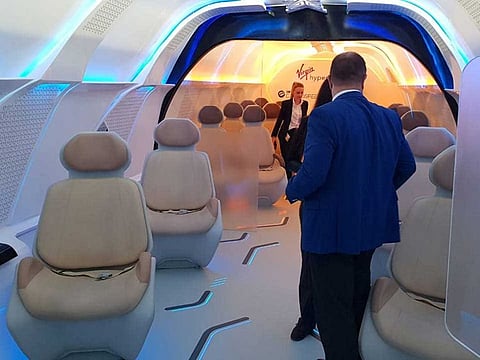Travel from Dubai to Abu Dhabi in 12 minutes using hyperloop
Passenger pods that could propel future hyperloop travel are a scene stealer at Motor Show

Dubai: Make the Dubai-Abu Dhabi trip in 12 minutes? Or travel to Riyadh from here in 48 minutes?
For the people at Virgin Hyperloop One, it is a message that needs repeating as cities and countries search for the next-generation mass transport solutions. It seems to be working.
These days, the jaw drops and raised eyebrows that accompanied any mention of hyperloop-enabled travel is being replaced - gradually - by a willingness to listen and get a better understanding.
“It’s true, from being dismissed as sci-fi, hyperloop has graduated to something transport authorities consider as a future model for mass transport,” said Harj Dhaliwal, Managing Director for the Middle East and India at VHO. “They see it as something real and that it’s gonna happen.”
The US company — in which Dubai’s DP World is a major investor — was something of a surprise presence at the ongoing Dubai International Motor Show.
There, it showed off the “passenger pods” that will, if all goes according to plan, take people through vast distances in minutes rather than hours. (Though still a prototype, the pods do look the part of a future transportation model. And much better fitted out than anything in the Tardis, the Dr. Who time machine.)
“The full-scale pods have passed through 400-500 tests at our Las Vegas base - now, we are ready to move that tech design onto a live commercial project,” said Dhaliwal.
The pods would speed - speed is the essence in making hyperloop viable - through extended tubes connected between cities. Think of it as super-speed bullet trains moving through a tunnel and not offering much by way of scenery.
The pods could reach speeds of up to 1,000 km/hr, while the company claims that these are 5-10 times “more energy efficient than a commercial airliner”.
The hyperloop concept and its commercial possibilities had an early backer in Elon Musk. And with such an ardent and persuasive backer on board, the technology and its many parts have been making progress. There are other players trying to come up with their versons of the hyperloop, notably HTT.
Proof of concept
Showing off the pods is one thing... getting active on the ground is another. This is where VHO says it has been making significant progress in recent months. In India, late next year, it will start work on a 12-kilometre stretch between Mumbai and Pune as part of the Phase 1 rollout.
“It will be the first time we are bringing the technology outside of the US; the intention is to set it up, certify it and get it approved by the regulators in that jurisdiction,” the official added. “We have not signed anything officially as yet - but the Mumbai project will be a marker.
“In the UAE or Saudi Arabia, it’s always possible that the authorities could take decisions to kick off such a project. Their track record is that when a decision is made, it moves quickly.”
Get the backing
This is where having a DP World on board will be of immense help. “They have a view that our technology can disrupt the cargo and logistics models of the future,” said Dhaliwal. “Where someone can place an order online and not expect something to arrive in weeks, but in hours. That will change the business of logistics and freight massively.”
Also, Dubai’s RTA (Roads and Transport Authority) “sits on our International Standards Working Group and they have been assessing our technology from where it was two years ago,” said Dhaliwal. “On our part, we need to understand how to fit into the overall vision of governments and city planners before signing deals. We are not rushing into this.
“We are working with governments, including in the US, to continue to develop hyperloop into reality. These mass transportation projects take planning and can’t be done overnight. Whether it’s a airport or a highway, a considerable amount of time is spent upfront on planning. What we offer is no different, and governments will need time to understand it, bring in regulations, etc.
“But hyperloop has a place in countries that don’t have the burden of legacy technology or legacy infrastructure for mass transportation needs. The Middle East is a classic example. Should these governments be spending more on legacy technology that’s been there for 50 years or more? Or should they invest in new transport systems that take them into the future?”
It’s a question VHO will keep asking of potential clients. The answer will decide the future of hyperloop.
Winning Approvals
In the US, Virgin Hyperloop One is currently issuing a request for proposal to states, regional or local governments and private organizations to create a “Hyperloop Certification Center”. It is said to have received 19 such interests, including those from West Virginia and Georgia. In India, the Maharashtra government approved the Virgin Hyperloop One-led consortium’s plans to develop a high-speed line between Mumbai and Pune.
_resources1_16a30b3cc87_medium.jpg?w=320&auto=format%2Ccompress&fit=max)







